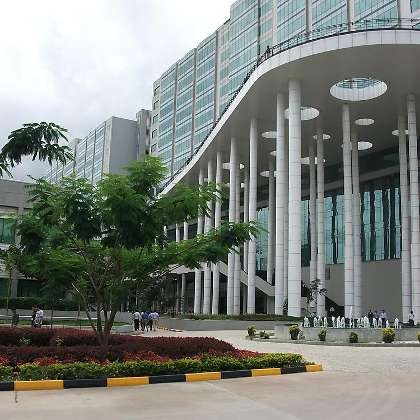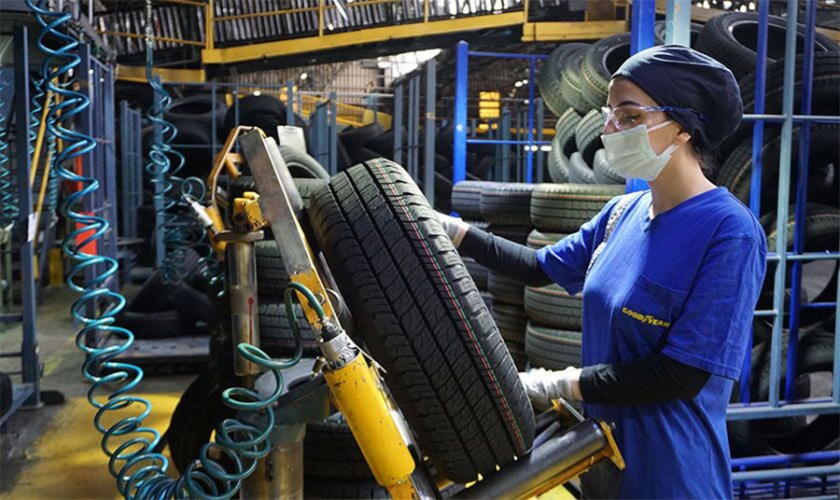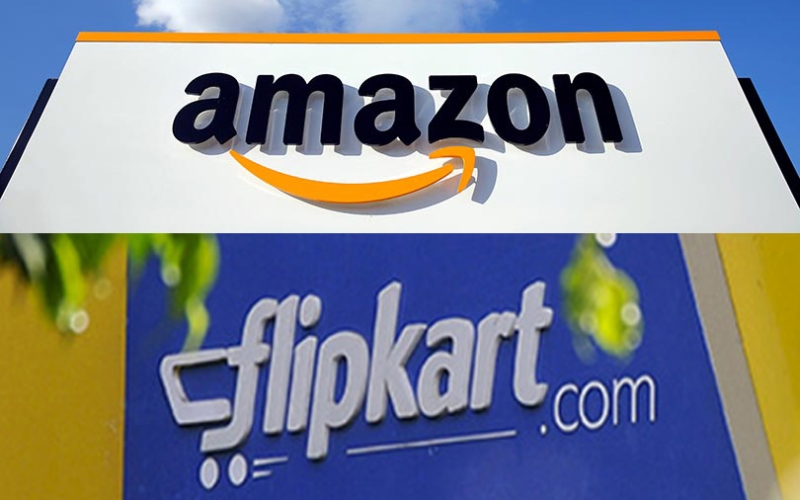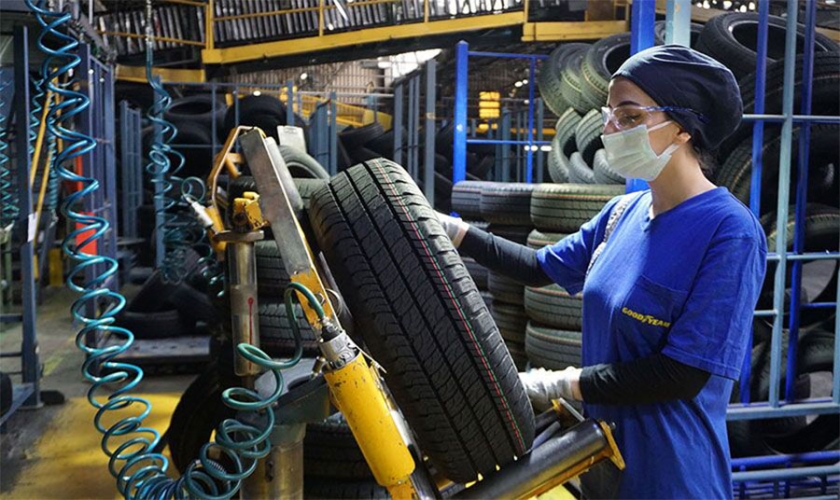6 stocks from hospital sectors with upside up to 27%: The selected stocks wherein the average stock report score is at least 4 which come under the neutral category. Further, the stock must have an overall rating of "Strong Buy" or "Buy". The list has then been sorted with the highest potential stock coming on the top of the list. The data used in screening the following four stocks has been gathered from the latest Refinitiv's Stock report dated Oct 22, 2023. Hospital stocks - Upside potential Oct 22, 2023 Company Name Avg Score Reco Buy Analyst Count Upside Potential% Inst Stake% Market Cap Type Market Cap Rs Cr Healthcare Global Enterprises 6 8 27.7 10.5 5,152 Apollo Hospitals Enterprise 4 23 25.8 45.1 Market Cap Type Market Cap Rs Cr Large 71,477 Company Name Fortis Healthcare Avg Score 8 Reco Buy 11 HealthCare Global Enterprises Limited is engaged in managing cancer hospitals, cancer centers and medical diagnostic services, including scientific testing and consultancy services in the pharmaceutical and medical sector. Apollo Hospitals Enterprise Limited is a company which is engaged in providing comprehensive hospital services. Fortis Healthcare Limited is an integrated healthcare delivery service provider. The Company is primarily engaged in the business of healthcare services. Narayana Hrudayalaya Limited is a holding company. The Company operates a network of hospitals, diagnostic centers, clinical centers or test laboratories. Aster DM Healthcare Limited is a healthcare service provider. The Company's segments include Hospitals, Clinics and Retail Pharmacies. Max Healthcare Institute Limited is a healthcare company. The company operates through the Medical and Healthcare Services segment. source:et
3 insights to kick-start the day, SoftBank's exit from Zomato: But the stocks became liquid, and SoftBank began offloading its Zomato shares in tranches. Zomato bounced back, its share price doubled in the past six months, and SoftBank benefitted. One last thing. SVF over time had invested around USD300 million in Blinkit. Including the remainder of Zomato shares (1.08%) it holds, SVF's total gains stand at USD340 million. The yellow metal is again in the spotlight, gradually climbing higher as most risky assets are failing to cheer investors. The language of price. Gold has been trading in a broad range between USD1,660 and USD2,080 since June 2020. It has formed a new base at USD1,660 levels. India reacted to the Canadian statement which invoked the Vienna Convention on Diplomatic Relations on removal of Canadian diplomats and their immunity. Hidden in plain sight. This weekend the Canada-India diplomatic row got murkier. India retorted to the statement by the Canadian Government issued on October 19 regarding Canadian diplomatic presence in India and said, the state of bilateral relations, the "much higher India, and their "continued interference" in India's "internal affairs" warranted a "parity" in mutual diplomatic presence. source:et
Indian IT companies at slowest growth since start: India's fourth-largest IT services provider Wipro, growth numbers are down to their FY99 levels. India's $245-billion IT industry may be staring at their slowes growth ever, data sourced by ET shows. Infosys Technologies Ltd., India's second- largest IT services company, is likely to report its slowest growth ever based on the current guidance of 1-2.5%, data sourced from brokerage firm BNP Paribas shows. For the country's fourth-largest IT services provider Wipro, growth numbers are down to their FY99 levels. For Tata Consultancy Services (TCS), India's No.1 software services exporter, and No.3 HCLTech, the growth this year will be the slowest since the pandemic. TCS had reported 0.8% revenue decline (in cc terms) in FY21 while HCLTech had logged just 1.1% growth--the lowest for both companies. India's $245-billion IT industry may be staring at their slowes growth ever, data sourced by ET shows. Infosys Technologies Ltd., India's second- largest IT services company, is likely to report its slowest growth ever based on the current guidance of 1-2.5%, data sourced from brokerage firm BNP Paribas shows. For the country's fourth-largest IT services provider Wipro, growth numbers are down to their FY99 levels. Tata Consultancy Services (TCS), India's No.1 software services exporter, and No.3 HCLTech, the growth this year will be the slowest since the pandemic. TCS had reported 0.8% revenue decline (in cc terms) in FY21 while HCLTech had logged just 1.1% growth--the lowest for both companies. "Some of the companies do risk posting their worst growth ever in 2024," Peter Bender-Samuel, CEO of consultancy firm Everest Group. source:et
Vedanta under high tides of mounting debt? The group has largely been a one-man show led by Anil Agarwal, (69) who started out as a scrap dealer at Kalbadevi after he moved from Bihar to Mumbai. Agarwal made his first acquisition of Sterlite Cables in the 70s helped by INR50,000 loan from Syndicate Bank (now Canara Bank). ICICI Securities and Yes Securities even stopped covering it. Kotak Institutional Investors immediately issued a sell advisory report with the headline 'Vertica Split- Six steps backwards. "The demerger reverses Vedanta's past efforts (during It has USD1billion 13.875% bonds due in January 2024, USD1 billion 6.125% bonds maturing in August 2024, and USD1.2 billion 8.95% bonds due in March 2025. This does not include other loans and interest on it. Vedanta is the largest oil and gas producer in India. It is the sole producer of nickel-used for making wires, gas turbines, and rocket engines-in India after it acquired Nicomet in 2021. It is also the largest maker of aluminium (outside China) with a captive power plant and aluminium refinery. The woes of India-listed Vedanta Ltd are entwined with that of its parent, which has a net debt of USD12.7 billion, per its FY23 annual report. "It would have been heart- wrenching for Agarwal to sell these shares," pointed out a bondholder. While Agarwal now has a higher stake in Vedanta, it has not increased his cash flow as his interest payout is much more than the dividend he earns from the higher stake. Vedanta Resources' debt snowballed to USD10 billion in FY12-from less than USD2 billion a year ago-after it acquired the oil and gas exploration company Cairn India. The demerger of Vedanta Ltd is largely to overcome its immediate challenge of arranging USD2 billion funding to repay bondholders. The company is working on a plan to raise USD1 billion bridge loan to repay a part of dues upfront to bondholders and extend maturities of remaining bonds, at different terms. But to raise the bridge loan, Agarwal will need to show visibility on how the loan would be paid back. source:et
चीन ने भारत के रबर उद्योग को डांवाडोल स्थिति में डाल दिया है: घरेलू रबर उद्योग के लिए वैश्विक मूल्य परिवर्तन कोई नई बात नहीं है। लेकिन जब दुनिया के सबसे बड़े आपूर्तिकर्ताओं में से एक अपस्फीति से बचता है, तो यह अनिश्चितता के लिए तैयार रहने का समय है। जुलाई में, दो वर्षों में पहली बार। हालांकि अगले महीने में स्थिति में सुधार हुआ, विशेषज्ञों का कहना है कि अर्थव्यवस्था अभी भी अपस्फीति के दबाव का सामना कर रही है। दुनिया की दूसरी सबसे बड़ी अर्थव्यवस्था और भारत के दूसरे सबसे बड़े व्यापारिक भागीदार में यह स्थिति व्यापारियों और निर्माताओं के लिए चिंता का कारण है। विशेषज्ञों का कहना है कि भारत चीन से बड़ी मात्रा में रबर का आयात करता है और अपस्फीति की स्थिति के कारण कमोडिटी की कीमतों में गिरावट का घरेलू प्राकृतिक रबर उद्योग पर मिश्रित प्रभाव पड़ेगा। भारत के रबर उद्योग को इसकी आवश्यकता होगी बाज़ार के उतार-चढ़ाव के अनुरूप ढलने के लिए और घरेलू अन्वेषण करें उपभोग को कम करने के उपाय का प्रभाव कम हो गया अंतर्राष्ट्रीय मांग, कहती है -रमेश केजरीवाल, अध्यक्ष इंडिया रबर इंडस्ट्री एसोसिएशन (AIRIA)। उनका कहना है, "यह भारतीय प्राकृतिक रबर क्षेत्र को कई तरह से प्रभावित कर सकता है। चीनी मांग कम होने से वैश्विक स्तर पर अधिक आपूर्ति होगी, जिससे भारतीय रबर निर्यात पर असर पड़ेगा। कम कीमतों के कारण भारतीय उत्पादकों को चुनौतियों का सामना करना पड़ेगा, जिससे उनका राजस्व और लाभप्रदता प्रभावित होगी। रबर पर निर्भर उद्योग ऑटोमोटिव और विनिर्माण क्षेत्रों की तरह, लागत लाभ का अनुभव हो सकता है, जिससे उनकी प्रतिस्पर्धात्मकता बढ़ जाएगी। हालांकि, घरेलू रबर उत्पादकों को आय बाधाओं का सामना करना पड़ेगा। टायर और औद्योगिक सामान जैसे रबर-गहन उत्पादों की मांग में बदलाव, आपूर्ति श्रृंखला और प्रतिस्पर्धात्मकता को नया आकार दे सकता है उद्योग. एक अपस्फीतिकारी वातावरण मांग में किसी भी वृद्धि को पूरा करने के लिए अनुसंधान, नवाचार और टिकाऊ खेती प्रथाओं में निवेश को प्रोत्साहित कर सकता है। राष्ट्र को आत्मनिर्भरता को बढ़ावा देते हुए प्राकृतिक रबर की गुणवत्ता और उपज बढ़ाने के प्रयास तेज करने चाहिए। यह रणनीतिक बदलाव घरेलू उद्योगों को बढ़ावा देने के भारत के लक्ष्यों के अनुरूप भी होगा। इसके अलावा, चूंकि घरेलू उत्पादन पर अपस्फीति-प्रेरित जोर मेक इन इंडिया पहल को मजबूत करता है, इससे आर्थिक विकास और रोजगार के अवसर बढ़ेंगे। चीन में मांग कम होने से वैश्विक स्तर पर अत्यधिक आपूर्ति हो सकती है, जिससे अंतरराष्ट्रीय रबर की कीमतें प्रभावित होंगी। इससे अधिक प्रतिस्पर्धी मूल्य निर्धारण वातावरण तैयार होगा, जो संभावित रूप से उच्च खपत की दिशा में भारत के अभियान में सहायता करेगा। वैश्विक मांग में सुधार और चीन की आर्थिक वापसी महत्वपूर्ण निर्धारक हैं। भारत के सक्रिय अनुकूलन और रणनीतिक पहलों के कार्यान्वयन से इसके खिलाड़ियों के लिए स्थिरीकरण में तेजी आ सकती है। घरेलू रबर की खेती को बढ़ाने, लचीली आपूर्ति नेटवर्क स्थापित करने और वैकल्पिक सामग्रियों का पता लगाने के प्रयासों से भी मदद मिल सकती है। source:et
30% तक की तेजी वाले 4 होम फाइनेंस स्टॉक: यदि कोई भारत में हाउसिंग फाइनेंस सेक्टर में जाता है, तो पहली पसंद एचडीएफसी आईटीडी होगी, एचडीएफसी बैंक के साथ विलय के बाद, एचडीएफसी में एक्सपोजर लेने के लिए, निवेशकों को एचडीएफसी बैंक खरीदना होगा, जो वे बाधाओं को देखते हुए कर सकते हैं या नहीं भी कर सकते हैं। जिसके तहत प्रत्येक फंड काम करता है. हाउसिंग फाइनेंस सेक्टर या बंधक कंपनियां व्यवसाय के लिए अच्छी हैं, लेकिन इससे भी अधिक महत्वपूर्ण यह है कि आप कौन सा स्टॉक खरीदते हैं। क्योंकि अगर किसी ने 20 साल पहले बंद हो चुकी डीएचएफएल की जगह एचडीएफसी लिमिटेड को चुना होता, तो परिणाम बहुत अलग होता। "मजबूत खरीद" या "खरीदें"। इसके बाद दी गई सूची को सूची के शीर्ष पर आने वाले उच्चतम संभावित स्टॉक के साथ क्रमबद्ध किया गया है। एनबीएफसी - हाउसिंग फाइनेंस - उन्नति की संभावना 20 अक्टूबर, 2023 कंपनी का नाम कैन फिन होम्स औसत स्कोर 5 रेको खरीदें विश्लेषक गणना 18 उल्टा संभावित% इंस्टेंट हिस्सेदारी% 30.7 34 मार्केट कैप प्रकार मार्केट कैप रु. करोड़ मध्य 10,188 एलआईसी हाउसिंग फाइनेंस कंपनी का नाम औसत स्कोर 8 रेको खरीदना विश्लेषक गणना 29 उपरी संभावना% 26.9 उदाहरण हिस्सेदारी% 73 मार्केट कैप प्रकार बड़ा बाजार पूंजीकरण करोड़ रु 25,680 कैन फिन होम्स लिमिटेड एक कंपनी है जो हाउसिंग फाइनेंस के कारोबार में लगी हुई है। कंपनी कॉर्पोरेट बीमा एजेंसी व्यवसाय गतिविधि में भी लगी हुई है। एलआईसी हाउसिंग फाइनेंस लिमिटेड एक हाउसिंग फाइनेंस कंपनी है। कंपनी घरों/इमारतों की खरीद, निर्माण, मरम्मत, नवीकरण के लिए वित्त प्रदान करने के व्यवसाय में लगी हुई है। होम फर्स्ट फाइनेंस कंपनी इंडिया लिमिटेड एक हाउसिंग फाइनेंस कंपनी है। कंपनी मुख्य रूप से आवास ऋण, वाणिज्यिक संपत्ति खरीदने के उद्देश्य से ऋण, संपत्ति के बदले ऋण और निर्माण वित्त के व्यवसाय में लगी हुई है।
फ्लिपकार्ट फिर से अमेज़न प्राइम को टक्कर देने की कोशिश कर रहा है: वार्षिक उत्सव बिक्री हमेशा ई-कॉमर्स प्रतिद्वंद्वियों अमेज़ॅन और फ्लिपकार्ट का सबसे प्रतिस्पर्धी पक्ष सामने लाती है। इस बार, अमेज़ॅन प्राइम को टक्कर देने के लिए फ्लिपकार्ट वीआईपी लॉन्च किया गया है। ई-कॉमर्स दिग्गज फ्लिपकार्ट और अमेज़ॅन अधिकांश मोर्चों पर आमने-सामने हैं। लेकिन एक क्षेत्र जहां फ्लिपकार्ट नॉन-स्टार्टर रहा है, वह है वफादार ग्राहक आधार बनाना। अपनी प्रमुख बिक्री द बिग बिलियन डेज़ से पहले, फ्लिपकार्ट ने ग्राहकों को लाने के लिए एक नया कार्यक्रम शुरू किया। इंडियन फेस्टिवल, अमेज़ॅन ने भारतीय खरीदारों के लिए प्राइम की एक नई, सस्ती पेशकश शुरू की। इसने वीडियो और ऑडियो सामग्री की पेशकश से तेजी से वितरण के प्रस्ताव को हटा दिया है। मुफ़्त और तेज़ डिलीवरी वाली पेशकश, जिसे प्राइम शॉपिंग एडिशन कहा जाता है, की कीमत आक्रामक रूप से INR399 रखी गई है, जिसे कई लोग फ्लिपकार्ट के वीआईपी को कमजोर करने की प्रतिक्रिया के रूप में देखते हैं। ऐसा इसलिए है क्योंकि वफादार सदस्य अधिक बार खरीदारी करते हैं, और अधिक खर्च करते हैं। मार्केट रिसर्च फर्म डेटम इंटेलिजेंस के अनुसार, अमेज़ॅन पर गैर-प्राइम शॉपर्स का औसत ऑर्डर मूल्य (एओवी) 1,000-रुपये 1,200 रुपये है, लेकिन प्राइम ग्राहकों के पास 1,800-रुपये 2,000 का बहुत अधिक एओवी है। डेटम इंटेलिजेंस के सलाहकार सतीश मीना कहते हैं "फ्लिपकार्ट के सुपरकॉइन्स आपके पास कितने अंक हैं, वे कब समाप्त होंगे, और फिर उन्हें भुनाने का एक अतिरिक्त कदम है, इसकी गणना के मामले में पूरे प्रस्ताव को थोड़ा जटिल बना देता है, अमेज़ॅन प्राइम के विपरीत, जो अग्रिम भुगतान और लाभ के मामले में एक सीधी पेशकश है ।" source:et
The stocks scored 10 on 10:this week: Up and down revisions in earnings per share of the company by the analysts and the average percentage change of those revisions. Risk score by evaluating a series of long term (5-year) and short term (90-day) stock performance measures including volatility, magnitude of returns, beta and correlation. Each factor is equally weighted. a list of companies that have scored an average score of 10 as of October 20, 2023. The list has been sorted on market capitalization. The companies with 10/10 average score and 'Strong Buy/Buy' recommendations from analysts. Company Strong Buy/ Buy Count Red /Sel Analysts' Mean Recommendation Hold Count Cour Union Bank of India Ltd Strong Buy 6 2 о Polycab India Ltd Buy 14 7 4 L&T Finance Holdings Ltd Buy 13 0 4 Coal India Ltd Buy 16 2 3 Global Health Ltd Buy 4 1 O PI Industries Ltd Buy 20 2 1 General Insurance Corporation of India Buy। 3 1 O Bank of Baroda Ltd Buy 20 8 Bank of India Ltd Buy 2 2 0 AIA Engineering Ltd Buy 11 3 0 source:et
China put India's rubber industry on wobbly grounds: Global price shifts is not new to the domestic rubber industry. But when one of the world's biggest suppliers skirts with deflation, it is time to be prepared for uncertainty. in July, the first time in over two years. Though the situation improved in the subsequent month, experts say the economy is still facing deflationary pressures. This situation in the world's second- largest economy and India's second-largest trading partner is a cause of concern for traders and manufacturer. India imports a significant volume of rubber from China, and a drop in commodity prices because of deflationary conditions would have a mixed effect on the domestic natural rubber industry, say experts. India's rubber industry will need to adapt to market fluctuations and explore domestic consumption avenues to mitigate the impact of reduced international demand, says Ramesh Kejriwal, President of All India Rubber Industry Association (AIRIA). He says, "it can affect the Indian natural rubber sector in several ways. Reduced Chinese demand would lead to oversupply globally, impacting Indian rubber exports. Indian producers will face challenges due to lower prices, affecting their revenue and profitability. Industries relying on rubber, like the automotive and manufacturing sectors, may experience cost advantages, boosting their competitiveness. However, domestic rubber growers will encounter income constraints. Shifts in demand for rubber-intensive products, such as tires and industrial goods, might reshape supply chains and competitiveness across industries. A deflationary environment can encourage investments in research, innovation, and sustainable cultivation practices to meet any rise in demand. The nation should intensify efforts to enhance the quality and yield of natural rubber, promoting self- sufficiency. This strategic shift would also align with India's goals of promoting domestic industries. Moreover, as the deflation-driven emphasis on domestic production strengthens the Make in India initiative, it would drive economic growth and employment opportunities. Reduced demand in China can lead to a global oversupply, affecting international rubber prices. This will create a more competitive pricing environment, potentially aiding India's drive towards higher consumption. Global demand recovery and China's economic rebound are significant determinants. India's proactive adaptation and implementation of strategic initiatives can expedite stabilisation for its players. Efforts to enhance domestic rubber cultivation, establish resilient supply networks and explore alternative materials can also help. source:et










Oct 23 2023, 11:48
- Whatsapp
- Facebook
- Linkedin
- Google Plus
0